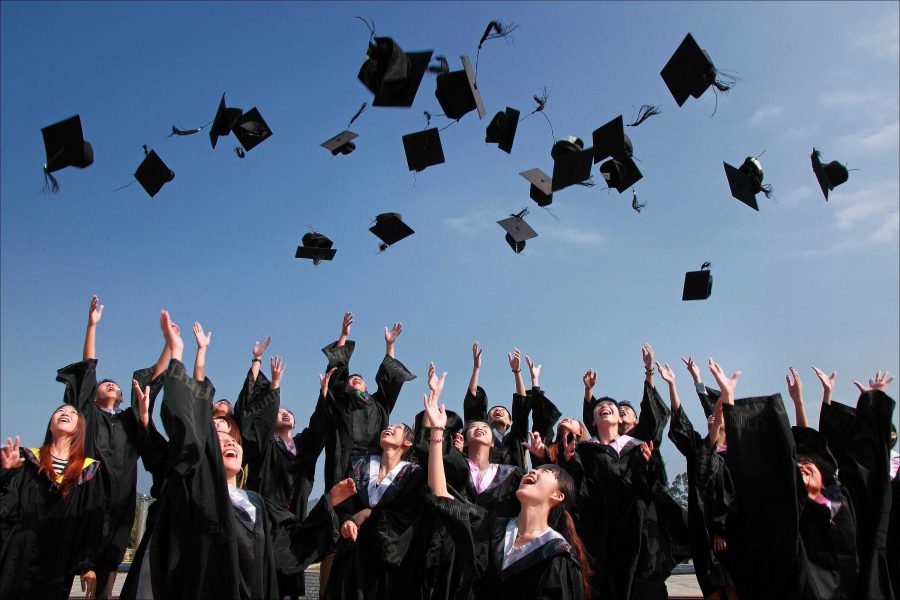Chung: New High School Graduates Should Consider Deferring Their First Semester of College
July 17, 2020
The coronavirus pandemic has altered many aspects of our lives — jobs, entertainment, food, education and more. It’s having a particularly heavy impact on recent high school graduates, 49% of whom say their plans after high school have changed due to the COVID-19 outbreak.
Many of these grads might feel like they have lost control of their life and are unsure about their future. Some might be reconsidering going to college this fall. These prospective students should not make swift decisions about whether to defer college but carefully consider the disadvantages of starting college in the throes of this public health crisis.
Limited Social Experience
College is a great place to develop essential social skills and establish valuable relationships. However, with many schools moving all their courses online and others reopening under strict social distancing guidelines, it will be difficult for students to have the kind of social experience they’ve anticipated for their first year of college. With so many restrictions on engaging in social activities, students could feel “disconnected” from their college community as one student recently described her spring experience to The Harvard Press. This fall semester will be particularly painful for freshmen, who are new to the higher education system, the curriculum and the environment and may also be coming to universities where they don’t have any preexisting connections.
Limitations in social interaction can be fatal to students’ extracurricular experiences. Recent high school graduates who have been looking forward to joining a particular club or even creating their own organization might feel discouraged after realizing that these options may not be open for them in the fall. Most extracurriculars on campus were stripped away after universities moved online this past semester, and the same problem could affect students’ campus life and social experience in the fall.
Limited Educational Experience
Students might feel their educational experience of college is inadequate and poor quality under these conditions. Many schools were unprepared for the pandemic, and some are still struggling to provide a high-quality education that is worth the cost. Remote learning doesn’t offer students the same kind of interaction with peers and faculty that they have on campus — which can undermine their motivation to do the work and may hurt the quality of classroom discussions. Students and parents have argued with schools about this matter, complaining that “the tuition tab should reflect that.”
At schools moving entirely to online classes this fall, students in highly hands-on majors such as arts and sciences will lose out on precious learning experiences. As UC Davis lecturer Michele Apriña Leavy shared on that school’s blog, “You can explain theory and have students read about it, but when it comes to the practical application students are at a disadvantage as they are unable to have true, real time interaction with another human being.”
Limited Resources
In addition to academic losses related to online or hybrid coursework, limited financial resources for both schools and students during the pandemic can affect the quality of their educational experience. Many schools have seen declining enrollment since the virus outbreak. This fact has seriously put universities’ finances at risk, which in turn can affect the availability of scholarships, educational technology and other resources for students. According to Michael Osborn, a vice president at Moody’s Investors Service, “Just over 30% of public universities and nearly 30% of private universities were already running operating deficits” before the pandemic. In the months since, several colleges have opted to furlough or lay off employees to save money, while others cut their athletic teams. College athletes receiving athletic scholarships could be largely disadvantaged by these decisions.
The financial crisis is particularly fatal for smaller public institutions that already have fewer resources than most private schools. Michael Horn, co-founder of the Clayton Christensen Institute, said in March, “I think [the transition to online curriculum] will be hastily done and without the resources that good online learning requires. It will leave a real sour taste in a lot of students’ mouths.” Now, the question is whether schools will be prepared to provide all students equal access to a high-quality education by fall. If this is not the case, then students’ tuition money will go to waste.
With so many things out of control, recent high school graduates may feel helpless and anxious about their future just like the rest of us. While college is a great opportunity that opens up many doors, it is not necessary to rush into it. Perhaps it would be wise for incoming students to take a semester or two off so they can start their post-secondary education the right way when this crisis is over.







